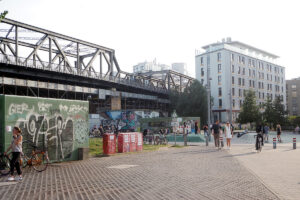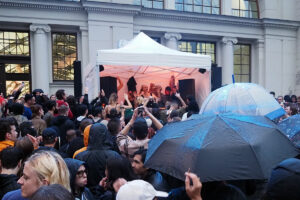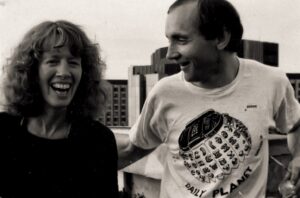Tuesday, June 20
Martin Eder, Elysium
Galerie EIGEN + ART
I.S. Kalter/Yana Tsegay
Mountains Gallery
On this day we determined to meet poet Donna Stonecipher and spend some unstructured time with her. We would begin with Galerie EIGEN + ART, last hold-out of the gallery wave that defined Auguststraße as emergent art district twenty years ago and representative of the Leipzig School, notably Neo Rauch. Most of the galleries that traversed the merger from East to West have left—most recently the conceptual gallery Barbara Wien—but EIGEN + ART kept its original location while branching out. (A search to find out what happened to the former Waschmachine gallery yields no trace but ads for the Whiteware brand of washing machine and “Hot German girl fucks dildo on Waschmachine,” on Xhamster). Such references intersect, in their vulgarity, with the work on view: a theatrical series of hyper-post-consumer-utopian-quasi-religious-fantasy tableaux by Martin Eder titled Elysium. As the gallery handout reads: “Since there are no blemishes, no disease, no suffering, and thus also no death in Elysium, the fresh moisture on the figures’ skin must come from the dew on Paradise’s meadows. ‘Dewy,’ as the beauty tutorials in the Internet call it.” The stretch from the conceptual rigor and ideology critique the gallery brought to Berlin, to the cynical avowal of kitsch grandstanding as having somewhat the same effect, defines the times we are in. Not much comment to make, so we proceed to a late lunch and walk a mile across Linienstraße to Pro QM Buchhandlung, nearby the always-beating heart of Left Berlin of Rosa-Luxemburg-Platz, the Volksbühne, Babylon Mitte, and the headquarters of Die Linke. After the surrealists’ calling as “specialists in revolt,” Pro QM sells books for “specialists in transformative urbanism,” from the psycho-geographical dérives of the situationists to current architectural studies and city guides, such as the one I brought back on Eisenhüttenstadt. It is home-in-exile on an intellectual plane that shows why we came here in the first place: to map the excitement of Berlin’s evolution as a city onto critical and creative projects. It is a source of thinking the city as one is within it.















